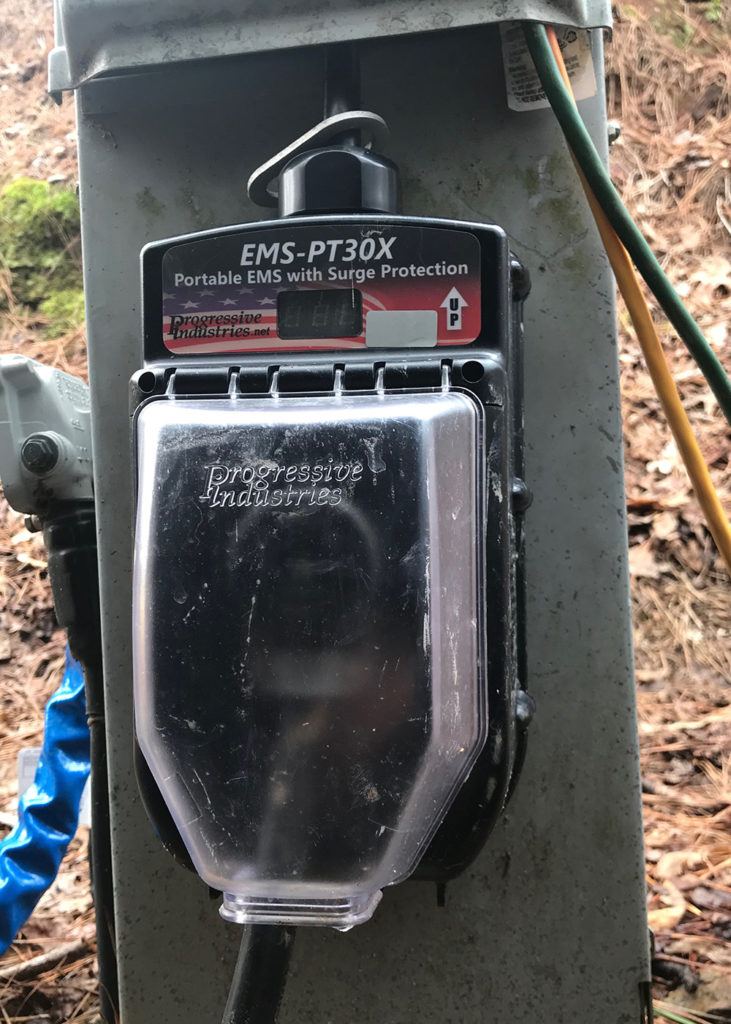Is your RV properly protected from electrical surges, faulty campground wiring, or even low voltage? Are you aware that normal RV surge protectors do not protect against some of the most damaging electrical conditions? Your RV is a big investment not to mention the contents inside your RV. It needs proper electrical protection, therefore you need to know what surge protector is right for your RV. The fact is, you most likely need something beyond a normal surge protector, you need an EMS (Electrical Management System).

Disclosure: This site contains affiliate links. Which means we may receive a commission, at no extra cost to you, if you purchase a product or sign up for a service on this page. The products and services on this site are mentioned because we believe in them and feel that they may be of value to you.
Normal Surge Protector vs EMS
An EMS protects beyond what a surge protector does. A surge protector only guards against spikes in electricity, like lightning strikes. In which the voltage surges several hundred to several thousand volts for just a fraction of a second. What an RV surge protector can NOT do is stop low voltage (104volts or lower) or high voltage (132volts or higher). These two conditions can cause damage to your electrical devices and equipment in your RV. Surge protectors also do NOT protect against open neutral or ground circuits or reverse polarity, though many do indicate the presence of these conditions. This is where the EMS steps in. Instead of just monitoring for these conditions, an EMS will shut off the power to your RV when these conditions are present.
Open Neutral & Grounds
Let’s talk a little more about some of the electrical conditions that an EMS will protect against. Open neutral and grounds. These two conditions which can occur in a campground shore power box present danger of electrocution. In both of these conditions, electricity is present but can have no place to go. With an open neutral, you have power but since the circuit is not complete nothing will work. In an open ground, everything electrical may work fine. But if there is some sort of fault or short in a circuit, the electricity cannot go to ground and trip the circuit breaker. Instead, the electrical current is still present, leaving a very high risk in electrocution. Both of these conditions can be very dangerous!
Reverse Polarity Condition
Reverse polarity is when the circuit is wired backward. In this
Other EMS Features
An EMS also has 240volt protection. If 240volts is being supplied to the EMS instead of 110volts (50amp RVs have two 110volt circuits while 30amp RVs have one 110volt circuit), the EMS will cut the power. This can occur in faulty campsite wiring.
Another feature of some EMS is an A/C time delay. When you plug in or turn on the power to your EMS, there will be a time delay before it will power your RV. This feature is to protect A/C units without built-in time delays when the EMS gets tripped and resets.
Here is a video showing the display on the Progressive Industries 30Amp EMS. It displays: voltage, amps,
EMS/Surge Protector Install Options
The type of installation is another decision to make when choosing what RV surge protector to purchase. On EMS units, anyway, there are two types of installation to choose. They are the direct plug-and-play and the wired-in installations. The wired-in/hardwired versions are usually a little less expensive, around $30 or so. Being wired-in you don’t have to find a place to store it when moving your RV. These units are also serviceable if they get damaged. A downside of them is if something does happen to it, you might be without power till it, or service. Though the EMS portion of the surge protector can be bypassed on some models.
Plug-and-play models are portable, you can easily take the unit from one RV to another. Though there is a worry of theft on these models, most have the means to lock them to the campground pole. The difference comes down to the question between portability and cost.
Conclusion
In your search for what RV surge protector to purchase, it may come down to what you keep in your RV. If you are a weekend camper who doesn’t carry any valuable electronics, then you might consider a normal RV surge protector. On the other hand, if you own a large RV with a lot of expensive electrical appliances and gadgets, you should consider an EMS. True, they are quite a bit more expensive than a regular RV surge protector. But an EMS actually protects your RV and its electronics from so much more. Appliances and electronics are way too expensive to trust with either faulty campground wiring or unknown electrical current.
Please Like and Share us on social media! Also, subscribe to our email list to stay up to date on new posts! Please leave a comment telling us what you think.


